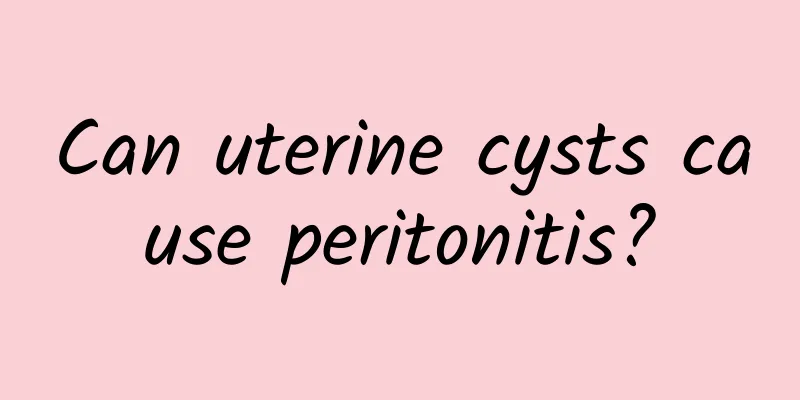What should I pay attention to after uterine effusion surgery?

|
Although uterine effusion is not a particularly serious disease and is also very common in gynecological diseases, if uterine effusion is not properly treated, it is very harmful. In severe cases, surgery is required. How is uterine effusion surgery performed? What should be paid attention to after the operation? Uterine effusion is the presence of inflammatory exudate in the pelvic cavity, which can occur after pelvic inflammatory disease, adnexitis or endometriosis (pathological). According to pathological factors, it can be divided into physiological uterine effusion and pathological uterine effusion. Physiological uterine effusion is not a bad thing for women, but pathological uterine effusion is more harmful. Once a woman suffers from this type of effusion, she should go to the hospital for treatment in time. Surgery is recommended for lumps such as hydrosalpinx or tubo-ovarian cysts; surgery is also recommended for small infection foci that cause repeated inflammation. So, how is uterine hydrops surgery performed? What should be paid attention to in diet after surgery? The principle of surgery is to completely cure the disease and avoid the chance of recurrence of residual lesions. Unilateral adnexectomy or hysterectomy plus bilateral adnexectomy should be performed. For young women, ovarian function should be preserved as much as possible. Single therapy for chronic pelvic inflammatory disease is less effective, so comprehensive treatment is appropriate. Uterine effusion diet taboos: 1. Eat light and easily digestible foods, such as adzuki beans, mung beans, winter melon, lentils, purslane, etc. Eat foods that have the effect of promoting blood circulation, regulating qi and dispersing knots, such as hawthorn, peach kernel, fruit dan peel, orange pit, orange peel, rose, kumquat, etc. Supplement protein appropriately, such as lean pork, duck, goose and quail, etc. 2. Avoid eating raw or cold foods such as cold drinks, fruits, etc. 3. Avoid spicy, warm and irritating foods such as chili peppers, mutton, dog meat, rooster, etc. 4. Avoid eating fatty, cold and sticky foods, such as fatty meat, crabs, snails, pickled and cured products, etc. 5. No smoking or drinking. The above is a brief introduction to uterine effusion. I hope it will be helpful to everyone after reading it. Women should pay attention to protecting their bodies and not let themselves easily suffer from gynecological diseases. |
<<: What should be paid attention to in the care of hysterectomy
>>: What should be paid attention to after uterine effusion surgery
Recommend
Why do pregnant women get candidal vaginitis?
Why do pregnant women get candidal vaginitis? Man...
Voting for the word that represents minor health problems: obesity
Obesity is the public enemy and is also the repre...
What are the main manifestations of prevention of cervical hypertrophy?
Cervical hypertrophy can be said to be very commo...
Does cervical erosion have any effect?
Does cervical erosion have any impact? 1. The cer...
5 tips for Jennifer Aniston's perfect arms
Some girls think that baggy "butterfly sleev...
What are uterine fibroids?
What are uterine fibroids? In the clinical treatm...
Experts analyze the causes of chronic cervicitis
What are the causes of chronic cervicitis? How do...
Sleep helps burn fat, losing weight is no longer a dream! Develop 5 good habits before going to bed and lose weight all the way to dawn
Weight loss and sleep are closely related! Suffic...
Menstrual pain is equivalent to opening the fingers
Many female friends are familiar with menstrual p...
There is a blacklist for souvenirs! Fruit is my favorite
The New Year is approaching, and everyone loves t...
Are long periods of sitting and eating out the main causes of waist obesity? 8 must-eat foods to slim your waist
Are you one of those people who sits for long per...
Polycystic ovary syndrome is a serious condition
Polycystic ovary syndrome (PCOS) is an important ...
What are the dangers of pelvic inflammatory disease
Pelvic inflammatory disease refers to inflammatio...
What is the main cause of vulvar leukoplakia?
Nowadays, the medical community calls the whiteni...
Does irregular menstruation affect pregnancy?
Does irregular menstruation affect pregnancy? Whe...


![[Video version] Lose weight by not eating rice and bread ~ The end result of "sugar-restricted diet" is myocardial infarction!](/upload/images/67dcfc9f5c0a1.webp)






